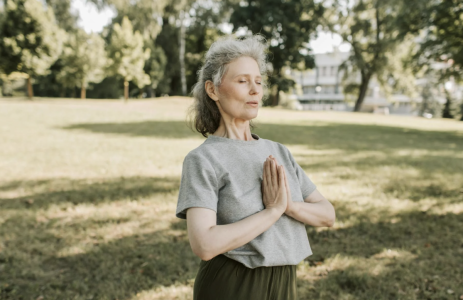The simple tweak that could make your workouts even better for your heart
By
Veronica E.
- Replies 0
Disclaimer: The information provided in this article is for educational purposes only and is not intended as a substitute for professional medical advice, diagnosis, or treatment. Always consult your physician or other qualified healthcare providers with any questions you may have regarding a medical condition or before making any changes to your health regimen.
If you're already making time to move your body, you're on the right track—but a new study suggests that when you exercise could be just as important as how.
For those trying to protect their heart and stay strong with age, the clock may offer a surprising advantage.
Researchers have found that aligning your workouts with your body’s natural rhythm might make a noticeable difference in heart health.
And it turns out, consistency matters just as much as effort.
Let’s take a look at why morning exercise may offer an extra boost—and what it means for your routine.

Heart health is still a growing concern
While heart attacks have become less common over the past several decades, not all news is good.
New data shows deaths from heart failure have jumped 146%, and hypertensive heart disease deaths are up 106%, according to the Journal of the American Heart Association.
That makes it even more important to find simple, science-backed strategies that can keep your heart healthy—especially for older adults.
Also read: Forget the gym! Discover the everyday activities that torch calories faster than exercise!
New study shows the power of early and regular movement
In a 2025 study published in Medicine & Science in Sports & Exercise, researchers followed nearly 800 adults, averaging age 76, to see how their activity patterns affected heart health.
Participants wore wrist trackers to log their movement and later completed fitness tests.
The results showed that people who exercised early in the day—and stuck to roughly the same time each day—had better cardiovascular and lung fitness.
Whether it was walking, gardening, or swimming, the timing and consistency mattered most.
Also read: The one exercise experts say can lower your blood pressure
What’s so special about morning workouts?
One reason early movement may be so beneficial has to do with our body’s circadian rhythm—our internal clock that helps regulate everything from sleep to hormone levels.
Dr. Karyn Esser, who led the study, explained that exercising at the same time every day helps reinforce this natural rhythm.
Earlier studies support this idea, too.
A 2023 study published in Obesity linked morning workouts (especially between 7 and 9 a.m.) to lower BMI, while another study found that 7 a.m. exercise helped improve blood pressure.
Also read: Is your daily sitting canceling out your exercise efforts? Avoid the hidden risks of too much sitting!
Don't stress if you’re not a morning person
It’s okay if mornings aren’t your thing.
The American Heart Association and Mayo Clinic agree: the best time to work out is the time you can stick with.
The real goal is staying active most days—ideally 30 minutes or more of moderate exercise like walking, swimming, or dancing.
That said, for those open to trying morning workouts, the added benefits may be worth the early wake-up call.

Also read: Say goodbye to low back pain with this simple, free exercise—Feel the difference quickly!
Why this matters more as we age
As we get older, our heart health becomes even more important, and building consistent, manageable habits can make a big difference.
Exercising in the morning might not just benefit your heart—it may also help you avoid distractions, stay cool in warm weather, and feel more energized throughout the day.
Plus, starting your day with a win often sets a positive tone that carries through to your meals, mood, and motivation.
Also read: The simple 15-minute habit that can change how you feel—starting today
A whole-body approach still matters most
While timing may offer a helpful boost, it’s just one piece of the puzzle.
A heart-healthy lifestyle also includes balanced meals, good sleep, regular check-ups, and managing stress in ways that work for you.
And of course, if you have any health concerns or are starting a new routine, check in with your doctor to make sure it’s a good fit for your needs.
Read next: 11 easy ways to move more every day—without hitting the gym

Are you someone who swears by early walks, or do you prefer afternoon stretches or evening strolls? Have you noticed any difference in your energy or mood depending on when you exercise? Share your routines and tips in the comments—we’d love to hear how you stay active and heart-healthy every day!
If you're already making time to move your body, you're on the right track—but a new study suggests that when you exercise could be just as important as how.
For those trying to protect their heart and stay strong with age, the clock may offer a surprising advantage.
Researchers have found that aligning your workouts with your body’s natural rhythm might make a noticeable difference in heart health.
And it turns out, consistency matters just as much as effort.
Let’s take a look at why morning exercise may offer an extra boost—and what it means for your routine.

Staying active at the right time each day may give your heart health an extra boost. Image Source: Pexels / Vlada Karpovich.
Heart health is still a growing concern
While heart attacks have become less common over the past several decades, not all news is good.
New data shows deaths from heart failure have jumped 146%, and hypertensive heart disease deaths are up 106%, according to the Journal of the American Heart Association.
That makes it even more important to find simple, science-backed strategies that can keep your heart healthy—especially for older adults.
Also read: Forget the gym! Discover the everyday activities that torch calories faster than exercise!
New study shows the power of early and regular movement
In a 2025 study published in Medicine & Science in Sports & Exercise, researchers followed nearly 800 adults, averaging age 76, to see how their activity patterns affected heart health.
Participants wore wrist trackers to log their movement and later completed fitness tests.
The results showed that people who exercised early in the day—and stuck to roughly the same time each day—had better cardiovascular and lung fitness.
Whether it was walking, gardening, or swimming, the timing and consistency mattered most.
Also read: The one exercise experts say can lower your blood pressure
What’s so special about morning workouts?
One reason early movement may be so beneficial has to do with our body’s circadian rhythm—our internal clock that helps regulate everything from sleep to hormone levels.
Dr. Karyn Esser, who led the study, explained that exercising at the same time every day helps reinforce this natural rhythm.
Earlier studies support this idea, too.
A 2023 study published in Obesity linked morning workouts (especially between 7 and 9 a.m.) to lower BMI, while another study found that 7 a.m. exercise helped improve blood pressure.
Also read: Is your daily sitting canceling out your exercise efforts? Avoid the hidden risks of too much sitting!
Don't stress if you’re not a morning person
It’s okay if mornings aren’t your thing.
The American Heart Association and Mayo Clinic agree: the best time to work out is the time you can stick with.
The real goal is staying active most days—ideally 30 minutes or more of moderate exercise like walking, swimming, or dancing.
That said, for those open to trying morning workouts, the added benefits may be worth the early wake-up call.

Don’t stress if you’re not a morning person—what matters most is finding a routine that works for you. Image Source: Pexels / SHVETS production.
Also read: Say goodbye to low back pain with this simple, free exercise—Feel the difference quickly!
Why this matters more as we age
As we get older, our heart health becomes even more important, and building consistent, manageable habits can make a big difference.
Exercising in the morning might not just benefit your heart—it may also help you avoid distractions, stay cool in warm weather, and feel more energized throughout the day.
Plus, starting your day with a win often sets a positive tone that carries through to your meals, mood, and motivation.
Also read: The simple 15-minute habit that can change how you feel—starting today
A whole-body approach still matters most
While timing may offer a helpful boost, it’s just one piece of the puzzle.
A heart-healthy lifestyle also includes balanced meals, good sleep, regular check-ups, and managing stress in ways that work for you.
And of course, if you have any health concerns or are starting a new routine, check in with your doctor to make sure it’s a good fit for your needs.
Read next: 11 easy ways to move more every day—without hitting the gym
Key Takeaways
- New research suggests exercising earlier in the day, and at a consistent time each day, provides the greatest benefits for heart health, regardless of the type or length of the workout.
- The study indicated that aligning physical activity with your natural circadian rhythms helps support better cardiorespiratory fitness, especially for older adults.
- Previous studies have found that working out between 7 and 9 a.m. is linked to a lower body mass index, and exercising at 7 a.m. could help improve blood pressure.
- Health experts, including the Mayo Clinic, recommend aiming for at least 30 minutes of moderate physical activity most days to optimize heart health.
Are you someone who swears by early walks, or do you prefer afternoon stretches or evening strolls? Have you noticed any difference in your energy or mood depending on when you exercise? Share your routines and tips in the comments—we’d love to hear how you stay active and heart-healthy every day!






